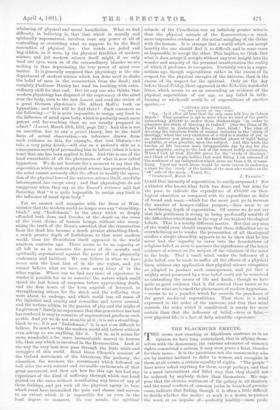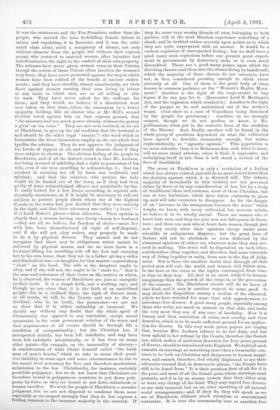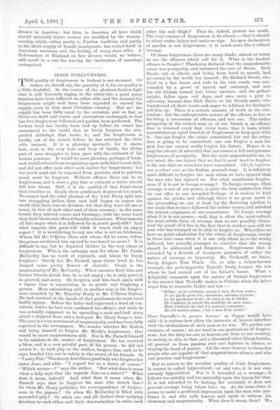THE BLACKBURN 1 1 31EUTE. T HE scene now enacting at Blackburn confirms
us in an opinion we have long entertained, that in allying them- selves with the democracy, the extreme advocates of women's rights committed a serious, it may even prove a fatal, blunder for their cause. It is the patricians, not the commonalty, who are by instinct inelined to defer to women, and recognise in them, at all events, a certain equality of rights. "The people" have never asked anything for them, except perhaps, and that in a most intermittent and fitful way, that they should not be seduced by anybody richer than themselves. We sup- pose that the obvious sentiment of the gallery in all theatres, and the usual verdicts of common juries in breach-of-promise cases, indicate that feeling, though it is often a little difficult to decide whether the motive at work is a desire to protect the weak, or an impulse of—perfectly healthy—caste pride. It was the aristocrats and the Ten-Pounders, rather than the people, who carried the laws forbidding female labour in mines, and regulating it in factories, and it was the culti- vated class alone, amid a conspiracy of silence, not only without clamour from the people, but without their express assent, who restored to married women, after injustice had lasted centuries, the right to the control of their own property. The artisans have never given women votes in their Unions, though the action of those Unions often involves the women's very lives ; they have never protested against the way in which women have been robbed of the benefit of ancient endow- ments; and they have steadily, almost unanimously, set their faces against women earning their own living by labour at any trade in which men are at all willing or able to work. They have never asked for the suffrage for them ; and they would, we believe, if a dissolution were ever taken on that issue, refuse the concession by a heavy majority, holding, like an elector who at Mr. Mill's second election voted against him on that express ground, that " the missuses had too much power already, without the gentry a givin' on 'em votes." They are not even inclined, as we see at Blackburn, to give up the old tradition that the husband is and should be the wife's legal "master,"—the word which in Lancashire the wives themselves employ as the one which best typifies the relation. They do not approve the judgment of the Lords of Appeal at all, and would dismiss them if they were subject to election. The obvious feeling of the people in Blackburn, and of all the district round, is that Mr. Jackson, not being accused of infidelity, had a right to possession of his wife, even if she were unwilling to acknowledge it ; that his conduct in carrying her off by force was creditable and spirited ; and that the relatives who protect the lady ought to be hooted out of the town, as if they had been guilty of some acknowledged offence not punishable by law. It really looked for a few hours, according to reports sub- stantially unanimous, as if it might be necessary to call out soldiers to protect people about whom one of the highest Courts in the realm had just decided that they were entirely in the right, and that their adversary was rather "a brute "- it is Lord Esher's phrase—than otherwise. Their opinion is clearly that, a woman having once freely chosen her husband —they are all, we believe, for freedom of choice—must live with him, loses thenceforward all right of self-disposal, and if she will not obey orders, may properly be made to do it by physical duresse. They cannot and do not recognise that there may be obligations which cannot be enforced by physical means, and 'Efee no more harm in a husband lifting his unwilling wife off her feet and carrying her to his own home, than they see in a father giving a sulky and disobedient son—or daughter, for that matter—a good sharp " clout " on the head. The wife or the daughter ought to obey, and if she will not, she might to be "made to ; " that is the sum and substance of their views on the matter, in which, be it observed, the women of Blackburn are just as energetic as their lords. It is a simple faith, and a working one ; and though we are clear that it is the faith of an uncivilised people—for in a civilised State, the right of duresse must, at all events, be left to the Courts and not to the in- dividual, who is, in truth, the prosecutor—we are not so clear that it is either unhealthy or immoral. We should say without any doubt that the whole spirit of Christianity was opposed to any constraint, except moral constraint, in the most permanent relation of the sexes, and that acquiescence at all events should be through life a condition of companionship ; but the Christian law, if interpreted strictly, has been left indefinite, and may have been left indefinite intentionally, as it has been on many other points—for example, on the immorality of slavery— in consideration of what Christ himself called "the hard- ness of men's hearts," which we take to mean their possi- tive inability in some ages and some circumstances to rise to the moral level necessary for free, and therefore meritorious, submission to the law. Christianity, for instance, certainly prohibits polygamy; but we do not know that Christians are therefore bound in polygamous countries to put down poly- gamy by force, as they are bound to put down infanticide or human sacrifice. We wish the people of Blackburn a sounder judgment, but we are not disposed to condemn them, more especially as we suspect strongly that they do but express a feeling common to the immense majority in the country. If
they do, some very worthy friends of ours, belonging to both parties, will at the next Election experience something of a shook, and be heckled rather severely upon points as to which they are quite unprepared with an answer. It would be a curious explosion of unsuspected feeling ; but we shall have a good many such explosions before our present great experi- ment in government by democracy ends, or is even much discredited. There are a good many points upon which the directing classes read ideas into the classes living by handicraft, which the majority of those classes do not entertain, have not, in fact, considered pressing enough to think about seriously at all. One of them is the great body of ideas known in common parlance as the "Women's Rights Move- ment." Another is the right of the wage-earner to buy liquor if he can pay for it. (Remember Lord R. Montagu's Act, and the explosion which crushed it.) Another is the right of the pauper to be well maintained out of the worker's wages. (Just show us a case of Guardians being dismissed by the people for parsimony.) Another, as we strongly suspect, though we do not profess to know, is Re- publicanism, when put in the concrete form of the abolition of the Throne. And, finally, another will be found in the whole group of questions dependent on what the cultivated have agreed to describe, reasonably enough, but rather euphemistically, as "agnostic opinion." This Ropulation is no more atheistic than it is Mahommedan, and, what is more, will no more stand atheism, when it finds it aggressive and embodying itself in law, than it will stand a revival of the fires of Smithfield.
The scene at Blackburn is only a revelation of a feeling which has always existed, and will do no more active harm than the decision against which it is directed will. The infinite majority of households in this country are not governed either by force or by any consideration of law, but by a body of traditional ideas and customs, most of them Christian, but one or two barbarian, which have taken centuries to grow up, and will take centuries to disappear. As for the danger of an "increase in the antagonism between the sexes," which weighs, we know, with many cultivated but nervous minds, we believe it to be wholly unreal. There are women who at heart hate men, and they are just now not infrequent in litera- ture; and there are men who at heart hate women, though just now they rarely utter their opinions except under some scientific or antiquarian disguise ; but the great laws of Nature will not be abolished, or even deflected by the abnormal opinions of either set, whatever noise they may suc- ceed in making. The sexes will be dependent on each other, and therefore cling together, and therefore find some tolerable way of living together in unity, from now to the day of judg- ment. Nor is there the smallest doubt that through all that period men will rule the world, and women will follow men, be the laws or the votes or the rights rearranged from time to time as they may. All that is no more subject to human imaginings than the growth of the crops is, or the procession of the seasons. The Blackburn gmeute will do no harm of that kind, and it may in another respect do some good. It may check the disposition among a section of the educated, which we have watched for some time with apprehension, to introduce free divorce. A good many people, especially among those who write, are much in earnest on that side, and make the very most they can of any ease of hardship. Now it is lunacy, and then conviction of crime, now cruelty, and then desertion, which is to be made sufficient ground for an applica- tion for divorce. In this very week, grave papers are urging that, because Mrs. Jackson refuses to do her duty, and has been upheld in her refusal by the Courts, therefore the Scotch law, which makes of malicious desertion for four years ground of divorce, should be introduced into England. We hold all such assaults on marriage as something more than a terminable con- tract, to be both un-Christian and dangerous to human happi- ness, and cannot, therefore, feel wholly displeased to see their advocates warned that, in democratic phrase, "the People have still to be heard from." It is their question first of all, for it is the poor, and most of all the female poor, whom marriage most protects, and it is by no means certain that they either wish or want any change of the kind. They may regard free divorce as not only immoral, but as an utter upsetting of all natural social arrangements ; and if they do, they will speak, as we see at Blackburn, without much attention to conventional restraints. It is true the commonalty bear or sanction free -divorce in America ; but then, in America, all laws which should naturally injure women are modified by the woman- worship which, owing partly to Puritan tradition and partly to the short supply of female immigrants, has rooted itself in American manners, and the feeling of every class alike. A IReferendum in England on free divorce would, we believe, 'still result in a vote for leaving the institution of marriage unimpaired.








































 Previous page
Previous page